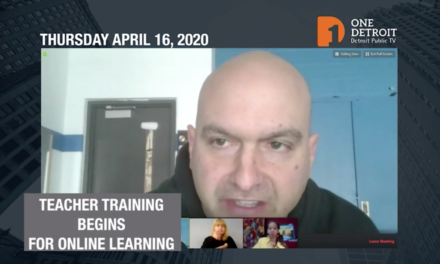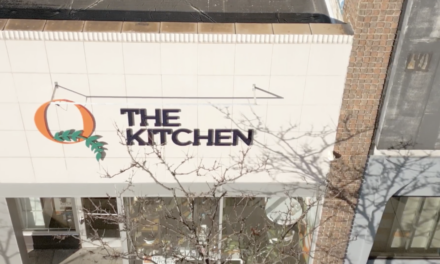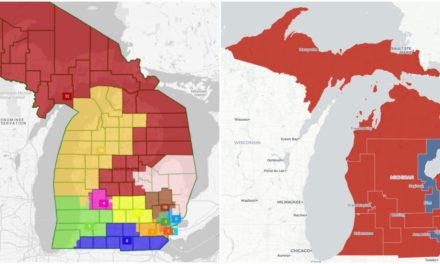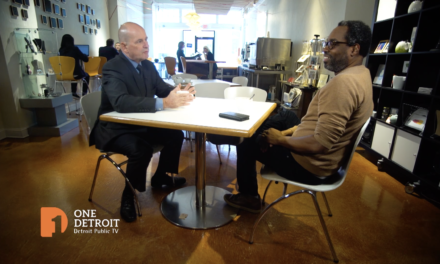Detroit’s music scene has always been on the map, but one scene, in particular, grew out of an underground sound that was completely different from the rest. Detroit’s industrial-inspired garage-rock/punk-rock scene grew out of a movement that matched the hardworking, blue-collar mentality that Detroit carries.
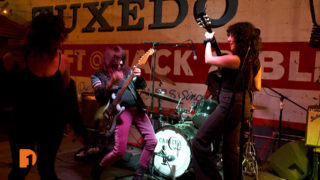
Detroit newcomers GiGi, featuring the legendary Detroit Cobra’s rocker Mary Cobra, performing at the band’s inaugural show during the Detroit All-Star Garage Rock Punk Revue. | Photo by One Detroit
In the early 1960s, Detroit’s punk rock history began with bands like MC5 and The Stooges, and then Cinecyde in 1976, who created the sounds of Detroit’s underground punk movement. Some of those early influential bands are still rocking out today, and they’re joined by a host of newcomers like The Idiot Kids, Sugar Tradition, and crossover artist Audra Kubat, who have taken the genre and made it their own.
The full scope of Detroit’s punk rock history was on display in August at the 4th annual Detroit All-Star Garage Rock Punk Revue. The 4th annual event spanned two days at the Cadieux Cafe, and served as the inaugural debut of Detroit rocker Mary Cobra’s new band, GiGi, which formed after the late Detroit Cobras’ singer Rachel Nagy, 48, passed away in January.
RELATED: Detroit All-Star Garage-Rock Punk Revue Returns for 4th Annual Festival, Expands to Two Days
One Detroit producer Chris Jordan takes viewers back to the two-day punk rock festival to learn more about the origins of Detroit’s punk rock history and how it continues to evolve. Jordan talks with festival organizer Smitt E. Smitty, of the 1980s Detroit band Figures on a Beach, and currently Little Billy Lost and Smitt E. Smitty and the Feztones; host and iconic radio DJ Michael Halloran, the former host of WDET’s Radios in Motion; and several of the artists who performed there.
The festival focused on more than just the City’s musical history, however. The festival was powered by collaboration and community. Jordan talks with the wide range of artists there about the foundation many of the early bands laid for others to now stand on, and how newcomers are turning those influences into their own unique sounds.
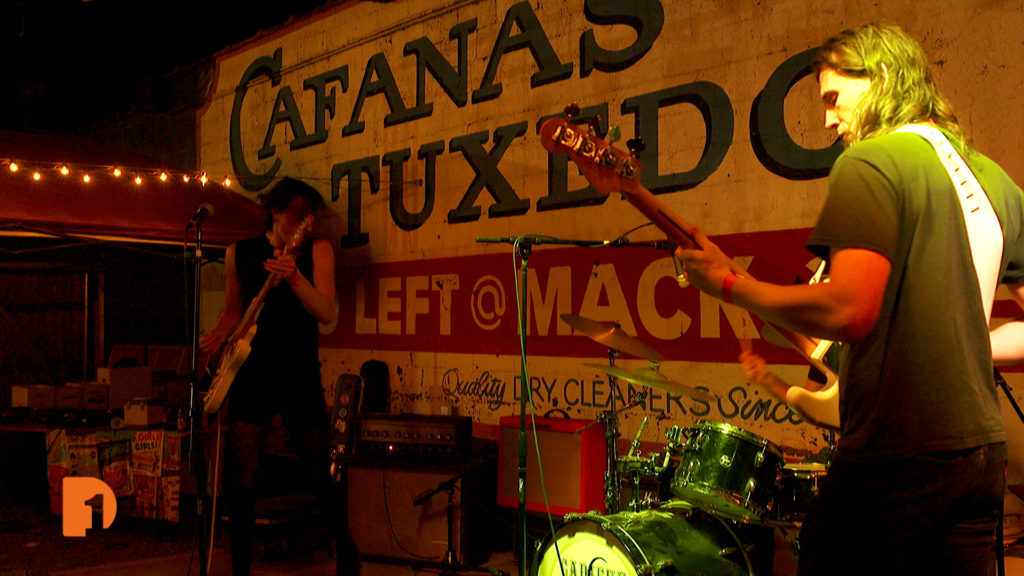
Detroit punk rock band The Idiot Kids perform their song “Nothing” at the Detroit All-Star Garage Rock Punk Revue two-day music festival. | Photo by One Detroit
Watch full live performances from The Plugs, The Idiot Kids, The Amino Acids, The 3D Invisibles, Sugar Tradition, Smitt E. Smitty & the Feztones, GiGi, Cinecyde, and Audra Kubat at the 4th annual Detroit All-Star Garage Rock Punk Revue below.
Watch Live Performances:
The Plugs – “Donna”
The Idiot Kids – “Nothing”
The Amino Acids – “Dunked in the Think Tank”
Sugar Tradition – “Biff Bang Pow”
The 3D Invisibles – “They Won’t Stay Dead”
Smitt E. Smitty and the Feztones – “Big Bad Boy”
GiGi – “Don’t Quit the Band”
Cinecyde – “Don’t Push Me”
Audra Kubat – “Oh Mother”
Full Transcript:
Smitt E. Smitty, Musician, Smitt E. Smitty & The Feztones, Little Billy Lost, Organizer, Detroit All-Star Garage Rock Puck Revue IV: Here we go! The fourth Detroit All-Star Garage Rock Punk Review.
Jarrett Koral, Founder, Jett Plastic Recordings, Sponsor, Detroit All-Star Garage Rock Punk Revue IV: Events like this really bring people together. Get people focused on the scene and get people focused on Detroit music.
Jon-Mikal, The Idiot Kids: I think Detroit just has its own sound. It’s kind of the birthplace of punk with MC5 and The Stooges, like everything kind of sprung out of from here.
Mary Cobra, GiGi; The Detroit Cobras: It’s a musical family, but it’s made up of so many influences. We don’t have one sound. So, when you say, “what’s our influence?”, Detroit.
Chris Jordan, Editor, One Detroit: The Detroit All-Star Garage Rock Punk Revue, a celebration of the underground side of Detroit music. After two years off due to COVID, the event came back bigger than ever in August as a two-night festival at the Cadieux Café.
Audra Kubat, Singer/Songwriter: People have been so grateful and they’re listening in a different way, a new way. Music kind of being stripped away from everybody, as well as all this other stuff we were losing, was like a wake-up call.
Rick Mills, The 3D Invisibles: Not playing just– it’s tough for me, it’s what I live for. It feels great. It feels great, seriously.
Chris Jordan: The event was organized by musician Smitt E. Smitty of Detroit’s Figures on a Beach, and was hosted by radio icon and former WDET “Radio’s In Motion” host Michael Halloran.
Smitt E. Smitty: This is the fourth one and after coming out of two or three years of COVID, I think everyone shot out of a cannon. Being able to still do this and get together with our friends and up-and-comers, it really is a very beautiful thing.
Jarrett Koral: What I really like about this event, in particular, is it’s essentially a building block foundational thing. So, younger bands can work with those older bands that have been established on the scene. Kids basically in the School of Rock can, they can work with bands like Cinecyde, that have been going for about 40 years.
Chris Jordan: The fourth Detroit All-Star Garage Rock Punk Revue features a cross-section of bands from the full four-and-a-half decade history of Detroit punk. From some of the city’s earliest punk bands to some of its newest, and even some musicians of the future from the School of Rock in Farmington.
Smitt E. Smitty: The first one really was a celebration. I didn’t really have anything in mind other than getting a bunch of old school friends of mine from back in the punk days, the late 70s and 80s, and the moment we decided we were going to do a second one, it was kind of like, okay, well, we did the one where we had mostly the old guard. Now I really want to go after some of the new and young bands that are happening in the Detroit music scene.
Jen David, GiGi: People who are elders of punk and rock and roll always have a leg to help lift up the next generation. People in Detroit are so ready to give a leg up.
Jon-Mikal: Yeah, it was great to play with a lot of these legendary bands that have been around since the 80s, and there’s a lot of young artists who are trying to come up with something new. So, this is a good showcase of a lot of different bands addressing punk in a different way.
Smitt E. Smitty: There is no music scene that even comes close to what the Detroit music scene is. I’ve been around the world and visited every city, Detroit, without any question, is the number one music scene on the planet. Everybody else is fighting for 2nd place.
Michael Halloran, Radio Host/DJ/Musician, The Plugs, Host, Detroit All-Star Garage Rock Punk Revue IV: Detroit was always on the map because of its music scene. But the Detroit bands that were existing at the time, were completely, radically, different, I think, than what was happening in Cleveland with the Dead Boys and Chicago.
Gary Reichel, Cinecyde: Detroit has kind of a brand on it all. We can be raw, hard, compelling rock and roll, over the top sometimes. And that punk rock scene, which was surely all of that, but it was even more.
Michael Halloran: I was listening to an interview that Berry Gordy gave when he was talking about why Motown songs sounded the way they did. And it’s because when he was working in the factories, there was something about the stamping the big machines that were doing all this work, that had a rhythm that got stuck in his head. Which basically became that whole boxer beat for on the floor. [imitates beat].
Mary Cobra: Like, we can’t get away from Motown and we obviously cannot get away from, “I Wanna Be Your Dog.”
Jon-Mikal: There’s kind of a very industrial, rough, raw pulse in the city that I think a lot of people tap into.
Smitt E. Smitty: Industry, blue collar, hardworking. It’s that kind of energy and I don’t know, just sort of the rock and roll ethic. The MC5 and The Stooges, anywhere but Michigan and they’re not happening.
Michael Halloran: Richie, our drummer in The Plugs, worked at Gear and Axle. So, as the drummer and hearing [imitates beat], you have this rhythmic thing. So, when you form a band, you’re going to have a thing that is in your life that basically drives your soul. And with Richie, it was that factory-type thing.
Michael Halloran: And that’s, in essence, why “Radio’s in Motion” was born. A lot of these bands from back in the day, I tried to play on the radio as much as possible. They were the people that were making Detroit cool and different. It was a point of pride with me, that Detroit had not stopped when Motown moved.
Michael Halloran: And I realized that thread that started in the earlies, Mutants, Cold Cock, R.U.R, Cinecyde, we’re kind of like the beginning of a thread, to me, that we were able to attach ourselves on and then slowly move down. And then, other bands came along Vertical Pillows, but that thread just keeps going. Sometimes it gets super thin, sometimes it gets fattened up.
Gary Reichel, Cinecyde: There’s always somebody stepping up and going, “Hey, I’ve got something to say, too.” And I think Smitty, and I know myself, we’re the mind, and it’s like, “Yeah, let’s hear what you have to say, yes, yes, yes, more, more, more.’
Chris Jordan: The lineup for the Detroit All-Star Garage Rock Punk Revue, followed this thread across the last four decades, sometimes branching off in unexpected directions.
Gary Reichel, Cinecyde: It is a collective. I mean, you’ve got the amino acids, which is kind of like this, this kind of compelling punk surf band. You’ve got the 3D invisibles, which, I think the 3D Invisibles should have been stars internationally. Smitt E. is in a couple of the bands. He’s got a Little Boy Lost and…
Smitt E. Smitty: Smitt E. Smitty and the Feztones, that leads more into my, like the art school guy starting a bid. And I probably have more in common with like Sparks and the B-52’s and Devo because there is definitely an art element.
Gary Reichel, Cinecyde: Then flipping over, you’ve got folky influence like Audra Kubat.
Audra Kubat: I kind of think that folk and punk music are actually kind of aligned. You know, maybe there’s sort of like a different avenue for the music. But the message is really similar. I think it’s sort of like being sort of fed up and ready for change, and angry about stuff, and sad, and broken, and mad. And so, I think that folk music is actually a kind of construct. It’s good to sort of bring in these different kinds of styles under the same sort of energy, of what punk rock or garage rock is. I’m seeing a lot of young punk bands, like kind of springing up, but mixing it with a little bit of acoustic. I think punk music is one of those musics, or even garage rock, that sort of lets everybody in.
Jon-Mikal: My writing style is very cathartic. It’s just me trying to get my thoughts across and through punk, I’m able to access a more kind of primal energy to them. The energy is very much punk, but I don’t know, I try not to write in a box to try and write a song that is punk. I just try to write a song and then see where it takes me. There’s definitely a lot of more experimental pop influences, a lot of influences, a lot of queer artists, myself being one. Yeah, just trying to take the music I like and make my version of it and try not to stick to one kind of formula. It’s really kind of a punk is, do your own thing.
Michael Halloran: I did really enjoy the younger, newer band Sugar Tradition.
Smitt E. Smitty: They opened for Jack White’s Band at Masonic and talk about the right place, right time. That was the night that Jack proposed. That was that night. So, they just, I tell you that…
Michael Halloran: That’s a historic weekend, or night, or whatever it was. And yeah, those guys were freaking amazing.
Chris Jordan: The Detroit All Star Garage Rock Punk Revue was also the debut concert performance by a brand new band, formed by legendary Detroit guitarist Mary Cobra and two members of the art rock band Shadow Show.
Smitt E. Smitty: Of course, everyone knows Mary Cobra from The Detroit Cobras, and with the passing of Rachel Nagy, it was kind of like, Oh, jeez, Mary, people love you. They want to see you perform, what are you doing? And then she told me about her band, GiGi.
Ava East, GiGi: That’s the thing about GiGi, we’re all coming from different bands originally, so this is like our, for lack of a better word, supergroup.
Mary Cobra: We are Detroit women dedicated to the power of an anthem.
Jen David: What I love about GiGi, too, though, is we have basically three generations of Detroit punk garage rock, whatever, because it’s like, you kind of started it. Yeah, you’re in the legend era, I’m in the millennial era, you guys are borderline Gen Z.
Ava East: We all have our individual influences. But we all come together because of how much we love music, how much we know the power of a song, and what makes a song a good song, at least, a great song. That’s all that matters.
Jen David: “Take Back The Night” was our first single that we released, and that was inspired by a demo that Mary got a hold of, that was something that Rob Tyner had been working on before he passed, that Mary unearthed, and we got to breathe new life into it. I’m just so excited for when we finish our album and get that out because it really feels like that first song is more like an homage. And this next song, “High Heels,” it feels like us. It really feels like all of us.
Mary Cobra: It’s another anthem.
Jen David: Oh, it’s an anthem!
Jon-Mikal: I feel like punk, in its essence, is just an energy. It’s just more of that kind of primal way of connecting to music, I guess.
Smitt E. Smitty: This is like Detroit’s finest. Whether they’ve been around forever or just popped up within the last year or two. I mean, this is like, oh, this came from Detroit. You know, this isn’t from L.A.? This isn’t from London? This isn’t from New York? It’s like, no, this is all Detroit.
Stay Connected:
Subscribe to One Detroit’s YouTube Channel & Don’t miss One Detroit Mondays and Thursdays at 7:30 p.m. on Detroit Public TV, WTVS-Channel 56.
Catch the daily conversations on our website, Facebook, Twitter @DPTVOneDetroit, and Instagram @One.Detroit
View Past Episodes >
Watch One Detroit every Monday and Thursday at 7:30 p.m. ET on Detroit Public TV on Detroit Public TV, WTVS-Channel 56.

